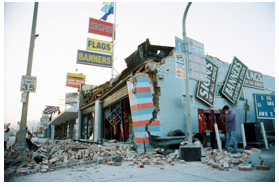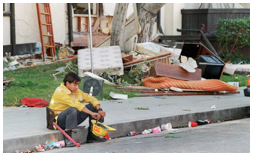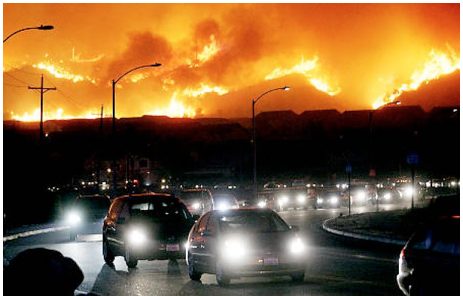CommentsGELFAND’S WORLD--This is intended to be an update on the status of our volunteer efforts in disaster preparedness in Los Angeles. The conclusion: We're not there. We need to get started on a public effort that will bring hundreds of thousands of people up to speed. What I find is that government professionals are concentrating on their own issues but largely ignoring the idea of a public-governmental partnership.
Here's my next point, not entirely tongue in cheek: Will governmental agency turf wars get some of us killed? Specifically, is the process of excluding the public from disaster planning creating unnecessary risks because government agencies cannot know everything about hundreds of local neighborhoods?
I raise these questions not out of certainty, but out of a sense of unease that I have been developing over the past year, and more particularly after attending a convention over the weekend. I know that last connection may sound a little strange, but bear with me.
The convention was in Torrance and was held for amateur radio operators, colloquially referred to as "hams." Their national organization, the American Radio Relay League (ARRL) was represented, along with subgroups that I have mentioned previously such as ARES (the amateur radio emergency service). I attended the convention in order to hear a couple of discussions on emergency communications and to talk with people who have been involved in that specialty for decades. What I heard was by parts encouraging, sometimes predictable, and in one notable exchange rather concerning.
Here is the good part: Amateur radio operators are members of organizations that are in place to assist the authorities in the event that the official communications systems are either inoperative or simply overloaded. In the aftermath of Hurricane Harvey, ham radio operators were able to send off messages asking the Coast Guard to rescue stranded people. In the event of a major fire here in California, amateur radio operators will be available (as they have been in many previous fires) to provide backup communications.
Notice that none of this is particularly germane to the situation that you and I would encounter in the immediate aftermath of a giant earthquake. The city has organized its professionals in a specific hierarchy that doesn't address the needs of your local neighborhood in the immediate aftermath of a serious quake.
 Still, it's good to know that the main lines of communication connecting the first responder government agencies will be backed up by skilled volunteers where needed. That doesn't solve the problems on your block, but it is something.
Still, it's good to know that the main lines of communication connecting the first responder government agencies will be backed up by skilled volunteers where needed. That doesn't solve the problems on your block, but it is something.
I learned one thing that was completely new to me: There is an organized group of amateur radio operators who interface with local hospitals in order to provide communications should the regular systems fail. Notice that for hospitals, it is extremely important to maintain adequate communications among hundreds of people, vehicles, and organizations. Whether the process is to coordinate helicopters or to ask for blood supplies, the needs concern human health and sometimes life itself. It's nice to know that an alternative to standard communications exists.
Beyond the good news, there were, however, concerns. Here is the gist: In one session, the speaker described the function of the communications volunteer within the city hierarchy. He made it clear that the proper place for the volunteer is to take orders from the professionals and to obey them. The radio volunteers fit into a particular niche in the city hierarchy. They are to go where they are told, do as they are told, and not to go off on their own in the attempt to imitate what the professionals do. In short, don't try to be a hero, show up on time, and wear the proper uniform.
I think this makes sense for the brush fire scenario and for a limited earthquake scenario. If the roads are open and electricity is flowing, and if there aren't too many injuries, that system is appropriate.
But in the big earthquake scenario, the official rules conflict with the needs that you and I will have in our immediate locations. We will be on our own unless we have some idea about what to do and how to join with others in doing it.
In last week's column, I suggested the simplest plan possible -- that half an hour after the shaking stops, people walk down to the corner and meet with somebody who has a hand-held radio. I left out the technical details, but the idea is that local emergency centers and the big emergency center in downtown L.A. would eventually amass information regarding injuries and structural damage and do their best to allocate help as efficiently as possible. The local volunteers would also be able to call locally for help that is already available in the immediate vicinity. The latter function might turn out to be critical for a lot of people.
When I talked about this idea with one of the conference speakers, I got a very strange response.
"You're not going to do that using ham radio!"
What followed was a quasi-explanation that there aren't enough radio frequencies available, and that the higher level organizations already have dibs on all the frequencies. In other words, "Stay off our turf." I was advised that we might be able to use a different kind of radio, but we shouldn't expect that civilians reacting at the local level would get any kind of respect from the higher level organizations.
This guy is a ranking official in the ARES organization, and he made it clear that as far as he is concerned, we locals should mind our business and our manners, and not get in the way of the pros.
Mind you, this response was in full cognizance that in the aftermath of the big quake, the professionals will be busy doing other things and will not be available for our paltry needs at the local level.
 When I mentioned the local radio operator sending a message up the line about somebody having a broken ankle, the reply was, "They don't care about your broken ankle."
When I mentioned the local radio operator sending a message up the line about somebody having a broken ankle, the reply was, "They don't care about your broken ankle."
As a member of the Neighborhood Council Emergency Preparedness Alliance (NCEPA), I've been learning about the many effective things that city agencies are doing. But I've also been struck by how distanced from the public these same agencies are. I think the remark about the broken ankle exemplifies this problem. There is a certain patriarchal tinge to the attitude. That attitude, if it is typical of the rest of the hierarchy, will make it extremely difficult to develop a working relationship between us civilians and the ranking officials.
What I ran into this weekend -- at least from one speaker -- was an attitude of father knows best. We civilians are basically being told to stay out of the way and mind our own business. The idea of dealing with broken bones on the local level seems to be lacking.
There was one other problem that was communicated to me more in whispers and nods than formally. It's not uncommon for government agencies to engage in turf wars. I didn't hear anything specific, but the year to year battle for city budget dollars is routine and chronic. The underfunding of the city's Emergency Management Department represents the tip of this problem. There is also a problem of getting enough qualified instructors to teach CERT (Community Emergency Response Team), a problem which the Fire Department and the city budget specialists don't seem all that interested in solving.
One person with a lot of experience explained to me that the issue of the broken ankle I was complaining about has a solution. As he explained, someone with CERT training can deal with that level of injury. I'll leave it to the reader to fill in the rest of the argument about the need to get past the budgetary turf wars and create enough CERT instructors.
A set of limitations such as lack of CERT training can result in unnecessary civilian deaths (or lost arms and eyes). We should view this as unacceptable. Right now, we lack a system whereby the government agencies sit down with civilians and discuss how we are to get from where we are to a prepared civilian population.
We civilians should be demanding a seat at the table when disaster preparedness is discussed. I think that this is what the Neighborhood Council Emergency Preparedness Alliance should be pushing. If four million residents of the city of Los Angeles don't know how to prepare and aren't getting leadership from the government agencies right now, then what do we need to do to stimulate that process?
Perhaps there is an answer right at hand. Notice that the emotional distance between city government and us civilians is exactly the problem that was supposed to be addressed by the creation of the neighborhood council system. Let's put the system to work.
The intent here is not to be negative about the big picture. What I've learned is that there is a lot of solid, productive work being done by the government agencies. There is also a lot of the same coming from unpaid volunteers such as public safety volunteers and amateur radio operators. The problem comes in bringing the two together at some level of mutual cooperation and mutual respect.
I hope to see the communications organizers from the fire department and ham radio come up with a comprehensive plan that will include people at all levels, including that one person standing on your corner with a hand held radio. We don't have to invade each others' turf in the process, but we do need to develop that plan.
Addendum
One commenter responded to my last column more or less as follows: Social media are a better method for connecting with people and convincing them to learn preparedness prior to a disaster. The radio amateurs and other volunteers are more appropriately used during and after the disaster. Of course I agree with that sentiment. The point of the last column (and this one) is to explore how to get to the point that we could all survive a major earthquake and then live through the aftermath in relative safety and comfort. Social media can be used to create an engaged public. Doing a little organizing of local response teams including radio operators is an important parallel process.
(Bob Gelfand writes on science, culture, and politics for CityWatch. He can be reached at [email protected])
-cw















